Positive Leader Essay: Authentic Leadership and Employee PsyCap
VerifiedAdded on 2022/11/14
|9
|3155
|425
Essay
AI Summary
This essay delves into the multifaceted realm of positive leadership, with a specific focus on authentic leadership and its profound influence on employee psychological capital (PsyCap). It meticulously examines the relationship between authentic leadership, Leader-Member Exchange (LMX), and how these factors contribute to building PsyCap across diverse employee groups, including professionals, administrative staff, and those engaged in emotional labor. The essay further investigates the critical role of emotions in shaping employee performance, highlighting the significance of emotional intelligence and management support in fostering a positive and productive work environment. The analysis provides valuable insights into how leaders can cultivate a work environment that enhances employee well-being, engagement, and overall organizational success, emphasizing the importance of trust, communication, and ethical behavior.
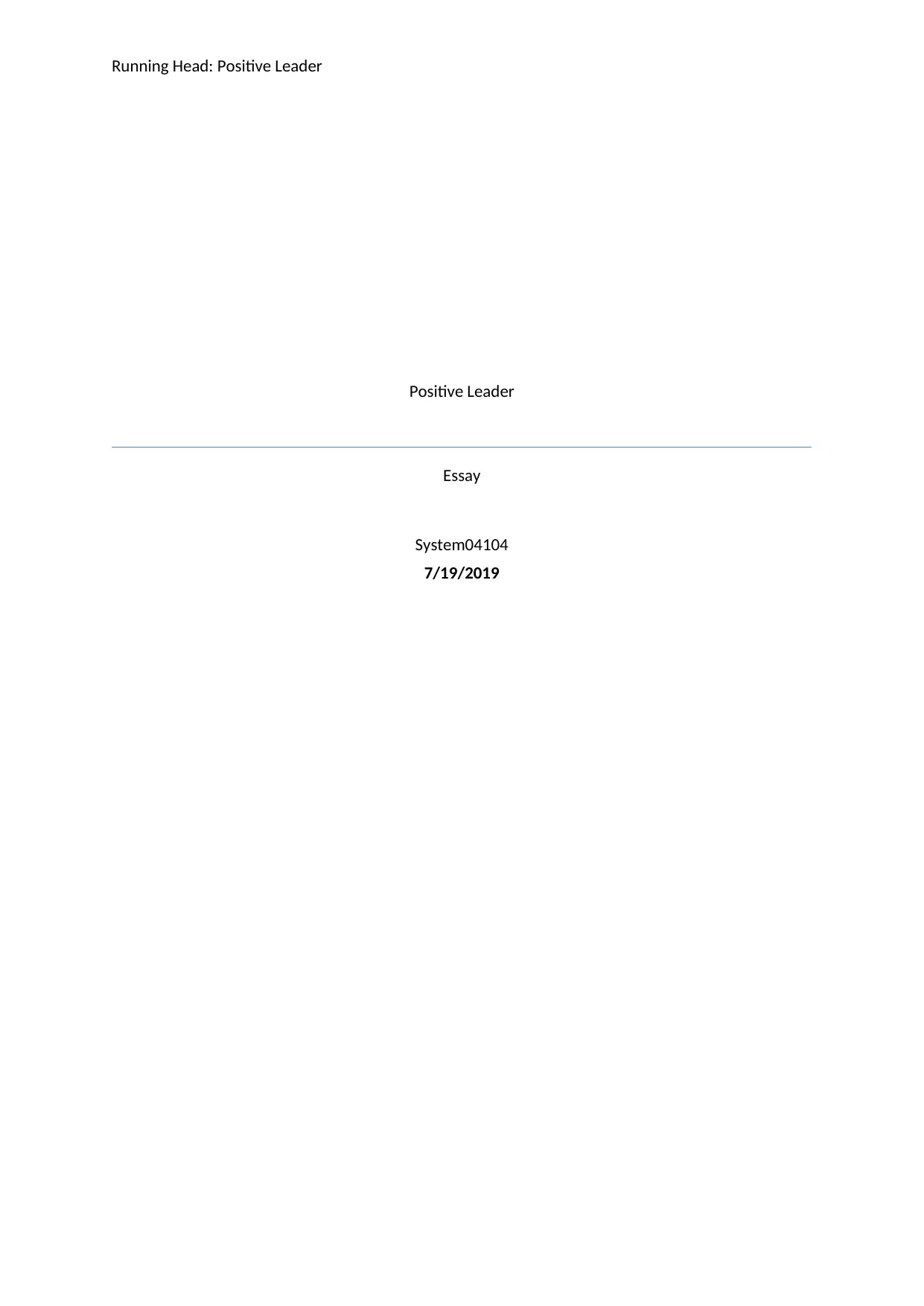
Running Head: Positive Leader
Positive Leader
Essay
System04104
7/19/2019
Positive Leader
Essay
System04104
7/19/2019
Paraphrase This Document
Need a fresh take? Get an instant paraphrase of this document with our AI Paraphraser
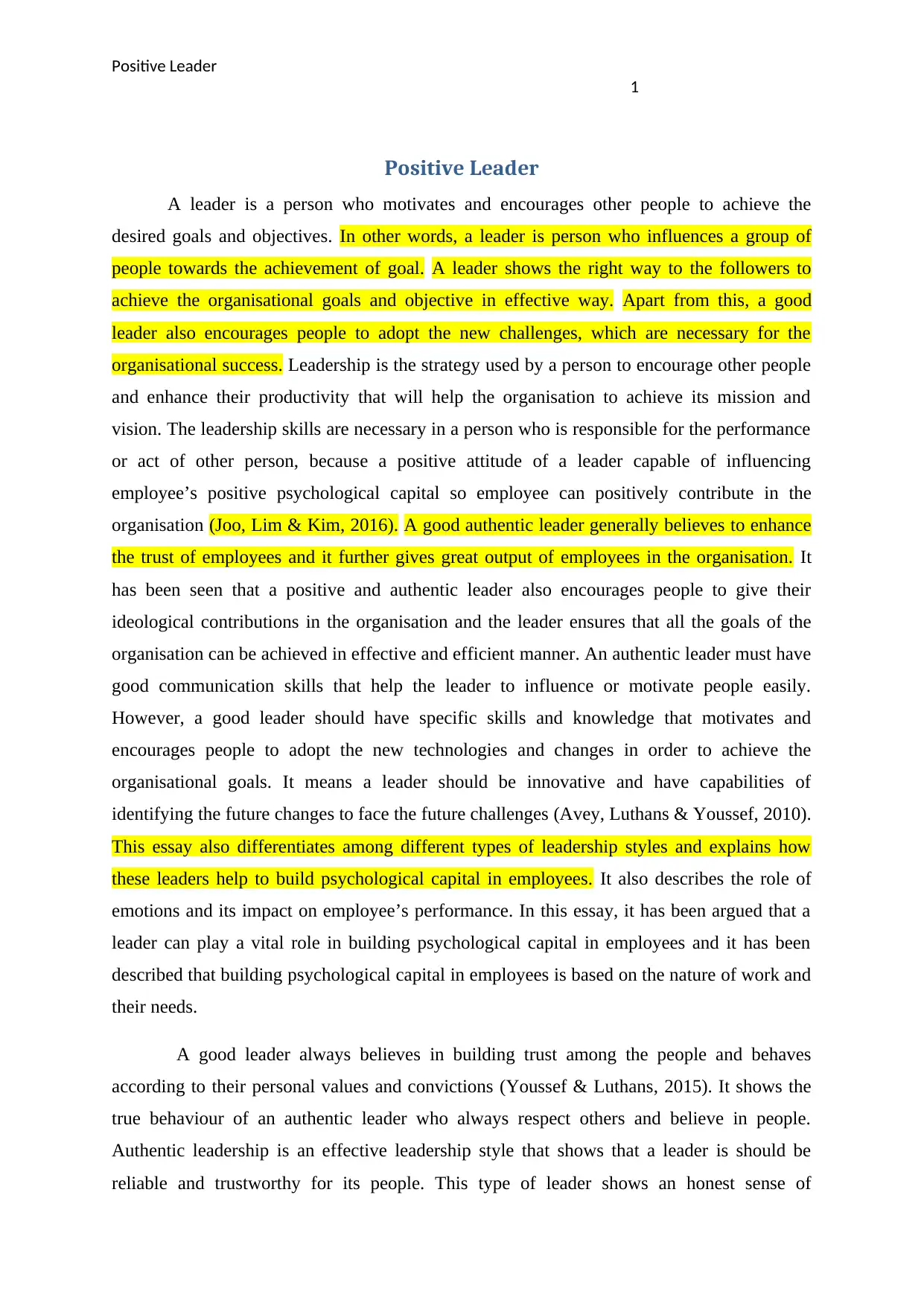
Positive Leader
1
Positive Leader
A leader is a person who motivates and encourages other people to achieve the
desired goals and objectives. In other words, a leader is person who influences a group of
people towards the achievement of goal. A leader shows the right way to the followers to
achieve the organisational goals and objective in effective way. Apart from this, a good
leader also encourages people to adopt the new challenges, which are necessary for the
organisational success. Leadership is the strategy used by a person to encourage other people
and enhance their productivity that will help the organisation to achieve its mission and
vision. The leadership skills are necessary in a person who is responsible for the performance
or act of other person, because a positive attitude of a leader capable of influencing
employee’s positive psychological capital so employee can positively contribute in the
organisation (Joo, Lim & Kim, 2016). A good authentic leader generally believes to enhance
the trust of employees and it further gives great output of employees in the organisation. It
has been seen that a positive and authentic leader also encourages people to give their
ideological contributions in the organisation and the leader ensures that all the goals of the
organisation can be achieved in effective and efficient manner. An authentic leader must have
good communication skills that help the leader to influence or motivate people easily.
However, a good leader should have specific skills and knowledge that motivates and
encourages people to adopt the new technologies and changes in order to achieve the
organisational goals. It means a leader should be innovative and have capabilities of
identifying the future changes to face the future challenges (Avey, Luthans & Youssef, 2010).
This essay also differentiates among different types of leadership styles and explains how
these leaders help to build psychological capital in employees. It also describes the role of
emotions and its impact on employee’s performance. In this essay, it has been argued that a
leader can play a vital role in building psychological capital in employees and it has been
described that building psychological capital in employees is based on the nature of work and
their needs.
A good leader always believes in building trust among the people and behaves
according to their personal values and convictions (Youssef & Luthans, 2015). It shows the
true behaviour of an authentic leader who always respect others and believe in people.
Authentic leadership is an effective leadership style that shows that a leader is should be
reliable and trustworthy for its people. This type of leader shows an honest sense of
1
Positive Leader
A leader is a person who motivates and encourages other people to achieve the
desired goals and objectives. In other words, a leader is person who influences a group of
people towards the achievement of goal. A leader shows the right way to the followers to
achieve the organisational goals and objective in effective way. Apart from this, a good
leader also encourages people to adopt the new challenges, which are necessary for the
organisational success. Leadership is the strategy used by a person to encourage other people
and enhance their productivity that will help the organisation to achieve its mission and
vision. The leadership skills are necessary in a person who is responsible for the performance
or act of other person, because a positive attitude of a leader capable of influencing
employee’s positive psychological capital so employee can positively contribute in the
organisation (Joo, Lim & Kim, 2016). A good authentic leader generally believes to enhance
the trust of employees and it further gives great output of employees in the organisation. It
has been seen that a positive and authentic leader also encourages people to give their
ideological contributions in the organisation and the leader ensures that all the goals of the
organisation can be achieved in effective and efficient manner. An authentic leader must have
good communication skills that help the leader to influence or motivate people easily.
However, a good leader should have specific skills and knowledge that motivates and
encourages people to adopt the new technologies and changes in order to achieve the
organisational goals. It means a leader should be innovative and have capabilities of
identifying the future changes to face the future challenges (Avey, Luthans & Youssef, 2010).
This essay also differentiates among different types of leadership styles and explains how
these leaders help to build psychological capital in employees. It also describes the role of
emotions and its impact on employee’s performance. In this essay, it has been argued that a
leader can play a vital role in building psychological capital in employees and it has been
described that building psychological capital in employees is based on the nature of work and
their needs.
A good leader always believes in building trust among the people and behaves
according to their personal values and convictions (Youssef & Luthans, 2015). It shows the
true behaviour of an authentic leader who always respect others and believe in people.
Authentic leadership is an effective leadership style that shows that a leader is should be
reliable and trustworthy for its people. This type of leader shows an honest sense of
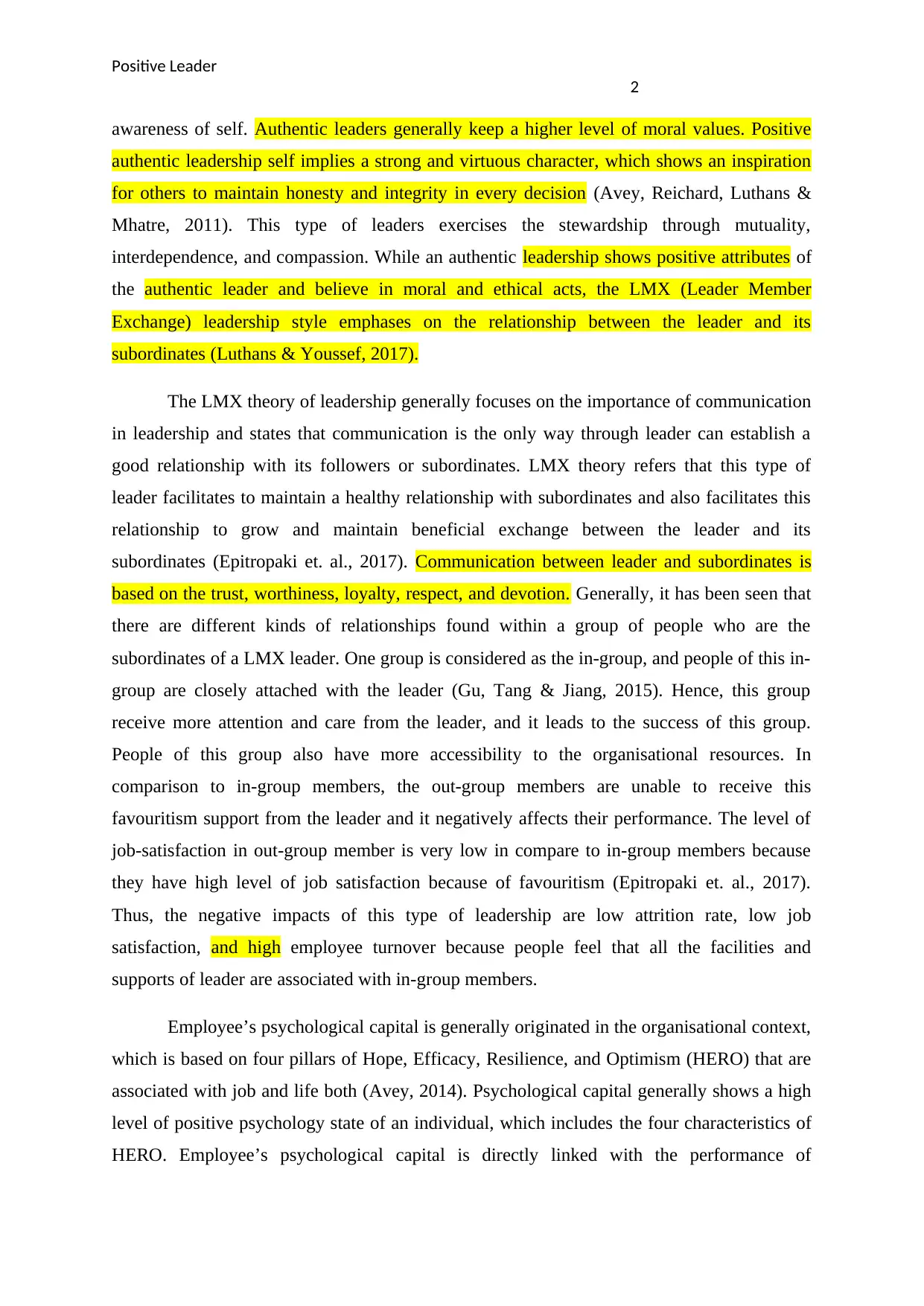
Positive Leader
2
awareness of self. Authentic leaders generally keep a higher level of moral values. Positive
authentic leadership self implies a strong and virtuous character, which shows an inspiration
for others to maintain honesty and integrity in every decision (Avey, Reichard, Luthans &
Mhatre, 2011). This type of leaders exercises the stewardship through mutuality,
interdependence, and compassion. While an authentic leadership shows positive attributes of
the authentic leader and believe in moral and ethical acts, the LMX (Leader Member
Exchange) leadership style emphases on the relationship between the leader and its
subordinates (Luthans & Youssef, 2017).
The LMX theory of leadership generally focuses on the importance of communication
in leadership and states that communication is the only way through leader can establish a
good relationship with its followers or subordinates. LMX theory refers that this type of
leader facilitates to maintain a healthy relationship with subordinates and also facilitates this
relationship to grow and maintain beneficial exchange between the leader and its
subordinates (Epitropaki et. al., 2017). Communication between leader and subordinates is
based on the trust, worthiness, loyalty, respect, and devotion. Generally, it has been seen that
there are different kinds of relationships found within a group of people who are the
subordinates of a LMX leader. One group is considered as the in-group, and people of this in-
group are closely attached with the leader (Gu, Tang & Jiang, 2015). Hence, this group
receive more attention and care from the leader, and it leads to the success of this group.
People of this group also have more accessibility to the organisational resources. In
comparison to in-group members, the out-group members are unable to receive this
favouritism support from the leader and it negatively affects their performance. The level of
job-satisfaction in out-group member is very low in compare to in-group members because
they have high level of job satisfaction because of favouritism (Epitropaki et. al., 2017).
Thus, the negative impacts of this type of leadership are low attrition rate, low job
satisfaction, and high employee turnover because people feel that all the facilities and
supports of leader are associated with in-group members.
Employee’s psychological capital is generally originated in the organisational context,
which is based on four pillars of Hope, Efficacy, Resilience, and Optimism (HERO) that are
associated with job and life both (Avey, 2014). Psychological capital generally shows a high
level of positive psychology state of an individual, which includes the four characteristics of
HERO. Employee’s psychological capital is directly linked with the performance of
2
awareness of self. Authentic leaders generally keep a higher level of moral values. Positive
authentic leadership self implies a strong and virtuous character, which shows an inspiration
for others to maintain honesty and integrity in every decision (Avey, Reichard, Luthans &
Mhatre, 2011). This type of leaders exercises the stewardship through mutuality,
interdependence, and compassion. While an authentic leadership shows positive attributes of
the authentic leader and believe in moral and ethical acts, the LMX (Leader Member
Exchange) leadership style emphases on the relationship between the leader and its
subordinates (Luthans & Youssef, 2017).
The LMX theory of leadership generally focuses on the importance of communication
in leadership and states that communication is the only way through leader can establish a
good relationship with its followers or subordinates. LMX theory refers that this type of
leader facilitates to maintain a healthy relationship with subordinates and also facilitates this
relationship to grow and maintain beneficial exchange between the leader and its
subordinates (Epitropaki et. al., 2017). Communication between leader and subordinates is
based on the trust, worthiness, loyalty, respect, and devotion. Generally, it has been seen that
there are different kinds of relationships found within a group of people who are the
subordinates of a LMX leader. One group is considered as the in-group, and people of this in-
group are closely attached with the leader (Gu, Tang & Jiang, 2015). Hence, this group
receive more attention and care from the leader, and it leads to the success of this group.
People of this group also have more accessibility to the organisational resources. In
comparison to in-group members, the out-group members are unable to receive this
favouritism support from the leader and it negatively affects their performance. The level of
job-satisfaction in out-group member is very low in compare to in-group members because
they have high level of job satisfaction because of favouritism (Epitropaki et. al., 2017).
Thus, the negative impacts of this type of leadership are low attrition rate, low job
satisfaction, and high employee turnover because people feel that all the facilities and
supports of leader are associated with in-group members.
Employee’s psychological capital is generally originated in the organisational context,
which is based on four pillars of Hope, Efficacy, Resilience, and Optimism (HERO) that are
associated with job and life both (Avey, 2014). Psychological capital generally shows a high
level of positive psychology state of an individual, which includes the four characteristics of
HERO. Employee’s psychological capital is directly linked with the performance of
⊘ This is a preview!⊘
Do you want full access?
Subscribe today to unlock all pages.

Trusted by 1+ million students worldwide
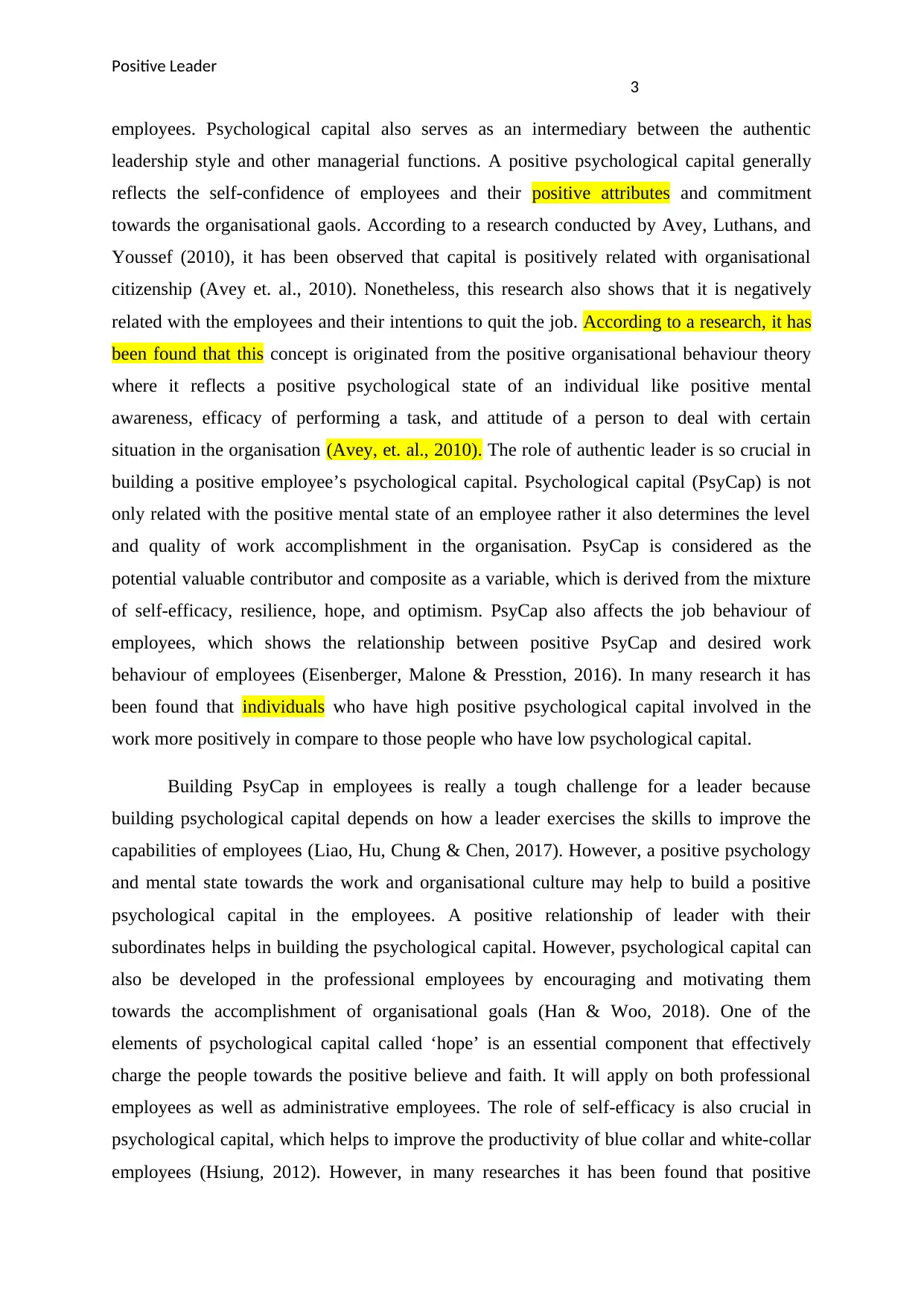
Positive Leader
3
employees. Psychological capital also serves as an intermediary between the authentic
leadership style and other managerial functions. A positive psychological capital generally
reflects the self-confidence of employees and their positive attributes and commitment
towards the organisational gaols. According to a research conducted by Avey, Luthans, and
Youssef (2010), it has been observed that capital is positively related with organisational
citizenship (Avey et. al., 2010). Nonetheless, this research also shows that it is negatively
related with the employees and their intentions to quit the job. According to a research, it has
been found that this concept is originated from the positive organisational behaviour theory
where it reflects a positive psychological state of an individual like positive mental
awareness, efficacy of performing a task, and attitude of a person to deal with certain
situation in the organisation (Avey, et. al., 2010). The role of authentic leader is so crucial in
building a positive employee’s psychological capital. Psychological capital (PsyCap) is not
only related with the positive mental state of an employee rather it also determines the level
and quality of work accomplishment in the organisation. PsyCap is considered as the
potential valuable contributor and composite as a variable, which is derived from the mixture
of self-efficacy, resilience, hope, and optimism. PsyCap also affects the job behaviour of
employees, which shows the relationship between positive PsyCap and desired work
behaviour of employees (Eisenberger, Malone & Presstion, 2016). In many research it has
been found that individuals who have high positive psychological capital involved in the
work more positively in compare to those people who have low psychological capital.
Building PsyCap in employees is really a tough challenge for a leader because
building psychological capital depends on how a leader exercises the skills to improve the
capabilities of employees (Liao, Hu, Chung & Chen, 2017). However, a positive psychology
and mental state towards the work and organisational culture may help to build a positive
psychological capital in the employees. A positive relationship of leader with their
subordinates helps in building the psychological capital. However, psychological capital can
also be developed in the professional employees by encouraging and motivating them
towards the accomplishment of organisational goals (Han & Woo, 2018). One of the
elements of psychological capital called ‘hope’ is an essential component that effectively
charge the people towards the positive believe and faith. It will apply on both professional
employees as well as administrative employees. The role of self-efficacy is also crucial in
psychological capital, which helps to improve the productivity of blue collar and white-collar
employees (Hsiung, 2012). However, in many researches it has been found that positive
3
employees. Psychological capital also serves as an intermediary between the authentic
leadership style and other managerial functions. A positive psychological capital generally
reflects the self-confidence of employees and their positive attributes and commitment
towards the organisational gaols. According to a research conducted by Avey, Luthans, and
Youssef (2010), it has been observed that capital is positively related with organisational
citizenship (Avey et. al., 2010). Nonetheless, this research also shows that it is negatively
related with the employees and their intentions to quit the job. According to a research, it has
been found that this concept is originated from the positive organisational behaviour theory
where it reflects a positive psychological state of an individual like positive mental
awareness, efficacy of performing a task, and attitude of a person to deal with certain
situation in the organisation (Avey, et. al., 2010). The role of authentic leader is so crucial in
building a positive employee’s psychological capital. Psychological capital (PsyCap) is not
only related with the positive mental state of an employee rather it also determines the level
and quality of work accomplishment in the organisation. PsyCap is considered as the
potential valuable contributor and composite as a variable, which is derived from the mixture
of self-efficacy, resilience, hope, and optimism. PsyCap also affects the job behaviour of
employees, which shows the relationship between positive PsyCap and desired work
behaviour of employees (Eisenberger, Malone & Presstion, 2016). In many research it has
been found that individuals who have high positive psychological capital involved in the
work more positively in compare to those people who have low psychological capital.
Building PsyCap in employees is really a tough challenge for a leader because
building psychological capital depends on how a leader exercises the skills to improve the
capabilities of employees (Liao, Hu, Chung & Chen, 2017). However, a positive psychology
and mental state towards the work and organisational culture may help to build a positive
psychological capital in the employees. A positive relationship of leader with their
subordinates helps in building the psychological capital. However, psychological capital can
also be developed in the professional employees by encouraging and motivating them
towards the accomplishment of organisational goals (Han & Woo, 2018). One of the
elements of psychological capital called ‘hope’ is an essential component that effectively
charge the people towards the positive believe and faith. It will apply on both professional
employees as well as administrative employees. The role of self-efficacy is also crucial in
psychological capital, which helps to improve the productivity of blue collar and white-collar
employees (Hsiung, 2012). However, in many researches it has been found that positive
Paraphrase This Document
Need a fresh take? Get an instant paraphrase of this document with our AI Paraphraser
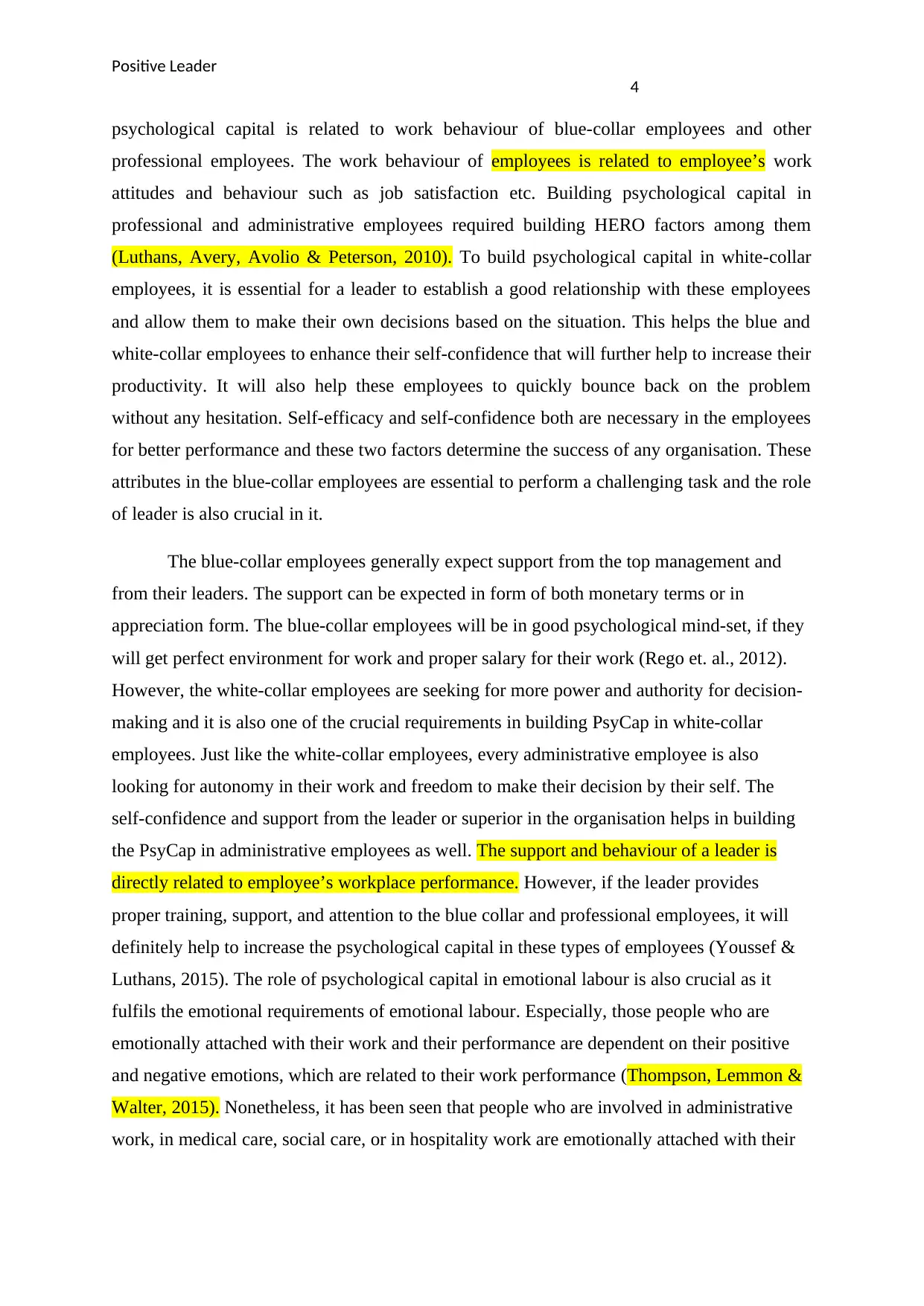
Positive Leader
4
psychological capital is related to work behaviour of blue-collar employees and other
professional employees. The work behaviour of employees is related to employee’s work
attitudes and behaviour such as job satisfaction etc. Building psychological capital in
professional and administrative employees required building HERO factors among them
(Luthans, Avery, Avolio & Peterson, 2010). To build psychological capital in white-collar
employees, it is essential for a leader to establish a good relationship with these employees
and allow them to make their own decisions based on the situation. This helps the blue and
white-collar employees to enhance their self-confidence that will further help to increase their
productivity. It will also help these employees to quickly bounce back on the problem
without any hesitation. Self-efficacy and self-confidence both are necessary in the employees
for better performance and these two factors determine the success of any organisation. These
attributes in the blue-collar employees are essential to perform a challenging task and the role
of leader is also crucial in it.
The blue-collar employees generally expect support from the top management and
from their leaders. The support can be expected in form of both monetary terms or in
appreciation form. The blue-collar employees will be in good psychological mind-set, if they
will get perfect environment for work and proper salary for their work (Rego et. al., 2012).
However, the white-collar employees are seeking for more power and authority for decision-
making and it is also one of the crucial requirements in building PsyCap in white-collar
employees. Just like the white-collar employees, every administrative employee is also
looking for autonomy in their work and freedom to make their decision by their self. The
self-confidence and support from the leader or superior in the organisation helps in building
the PsyCap in administrative employees as well. The support and behaviour of a leader is
directly related to employee’s workplace performance. However, if the leader provides
proper training, support, and attention to the blue collar and professional employees, it will
definitely help to increase the psychological capital in these types of employees (Youssef &
Luthans, 2015). The role of psychological capital in emotional labour is also crucial as it
fulfils the emotional requirements of emotional labour. Especially, those people who are
emotionally attached with their work and their performance are dependent on their positive
and negative emotions, which are related to their work performance (Thompson, Lemmon &
Walter, 2015). Nonetheless, it has been seen that people who are involved in administrative
work, in medical care, social care, or in hospitality work are emotionally attached with their
4
psychological capital is related to work behaviour of blue-collar employees and other
professional employees. The work behaviour of employees is related to employee’s work
attitudes and behaviour such as job satisfaction etc. Building psychological capital in
professional and administrative employees required building HERO factors among them
(Luthans, Avery, Avolio & Peterson, 2010). To build psychological capital in white-collar
employees, it is essential for a leader to establish a good relationship with these employees
and allow them to make their own decisions based on the situation. This helps the blue and
white-collar employees to enhance their self-confidence that will further help to increase their
productivity. It will also help these employees to quickly bounce back on the problem
without any hesitation. Self-efficacy and self-confidence both are necessary in the employees
for better performance and these two factors determine the success of any organisation. These
attributes in the blue-collar employees are essential to perform a challenging task and the role
of leader is also crucial in it.
The blue-collar employees generally expect support from the top management and
from their leaders. The support can be expected in form of both monetary terms or in
appreciation form. The blue-collar employees will be in good psychological mind-set, if they
will get perfect environment for work and proper salary for their work (Rego et. al., 2012).
However, the white-collar employees are seeking for more power and authority for decision-
making and it is also one of the crucial requirements in building PsyCap in white-collar
employees. Just like the white-collar employees, every administrative employee is also
looking for autonomy in their work and freedom to make their decision by their self. The
self-confidence and support from the leader or superior in the organisation helps in building
the PsyCap in administrative employees as well. The support and behaviour of a leader is
directly related to employee’s workplace performance. However, if the leader provides
proper training, support, and attention to the blue collar and professional employees, it will
definitely help to increase the psychological capital in these types of employees (Youssef &
Luthans, 2015). The role of psychological capital in emotional labour is also crucial as it
fulfils the emotional requirements of emotional labour. Especially, those people who are
emotionally attached with their work and their performance are dependent on their positive
and negative emotions, which are related to their work performance (Thompson, Lemmon &
Walter, 2015). Nonetheless, it has been seen that people who are involved in administrative
work, in medical care, social care, or in hospitality work are emotionally attached with their
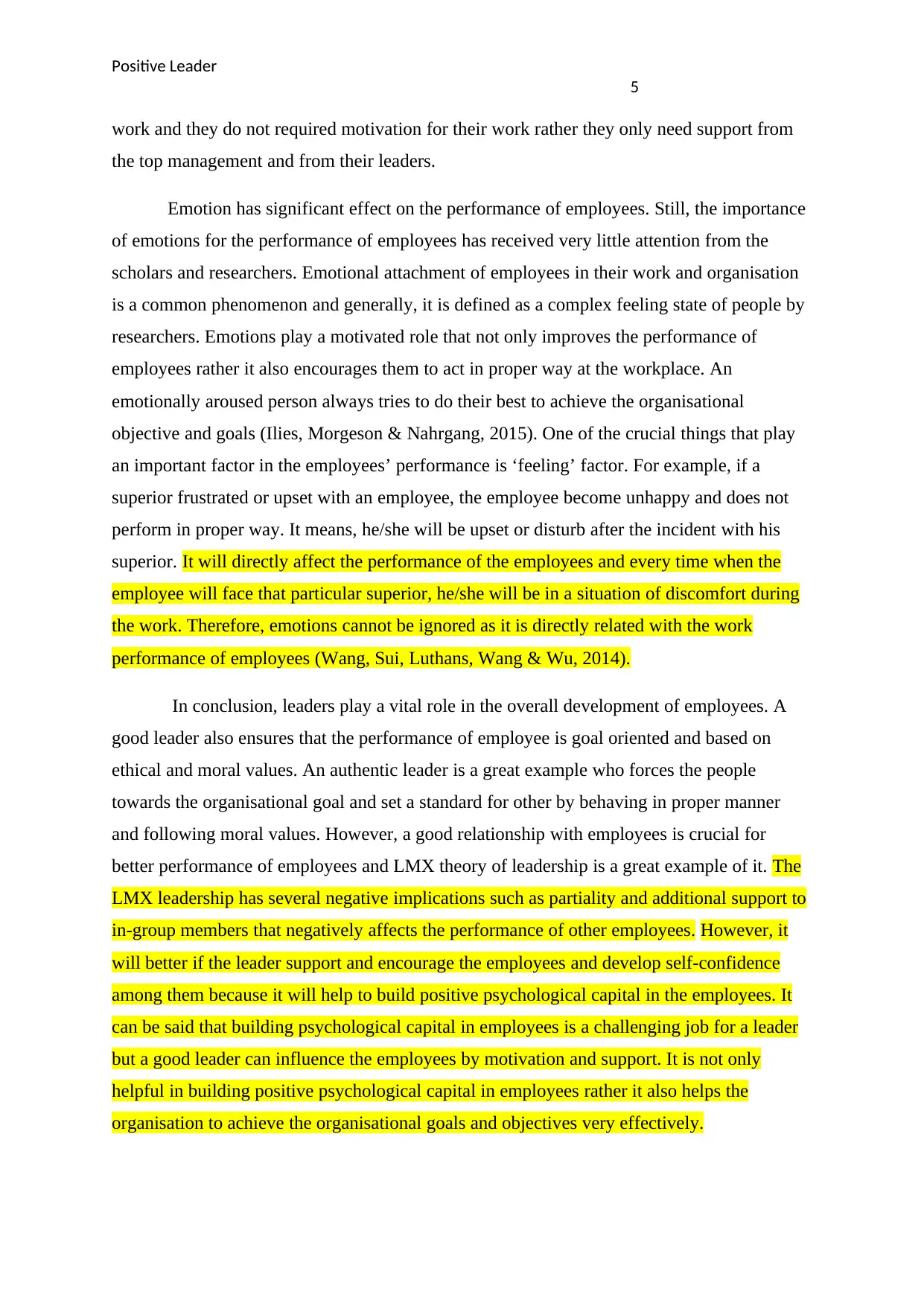
Positive Leader
5
work and they do not required motivation for their work rather they only need support from
the top management and from their leaders.
Emotion has significant effect on the performance of employees. Still, the importance
of emotions for the performance of employees has received very little attention from the
scholars and researchers. Emotional attachment of employees in their work and organisation
is a common phenomenon and generally, it is defined as a complex feeling state of people by
researchers. Emotions play a motivated role that not only improves the performance of
employees rather it also encourages them to act in proper way at the workplace. An
emotionally aroused person always tries to do their best to achieve the organisational
objective and goals (Ilies, Morgeson & Nahrgang, 2015). One of the crucial things that play
an important factor in the employees’ performance is ‘feeling’ factor. For example, if a
superior frustrated or upset with an employee, the employee become unhappy and does not
perform in proper way. It means, he/she will be upset or disturb after the incident with his
superior. It will directly affect the performance of the employees and every time when the
employee will face that particular superior, he/she will be in a situation of discomfort during
the work. Therefore, emotions cannot be ignored as it is directly related with the work
performance of employees (Wang, Sui, Luthans, Wang & Wu, 2014).
In conclusion, leaders play a vital role in the overall development of employees. A
good leader also ensures that the performance of employee is goal oriented and based on
ethical and moral values. An authentic leader is a great example who forces the people
towards the organisational goal and set a standard for other by behaving in proper manner
and following moral values. However, a good relationship with employees is crucial for
better performance of employees and LMX theory of leadership is a great example of it. The
LMX leadership has several negative implications such as partiality and additional support to
in-group members that negatively affects the performance of other employees. However, it
will better if the leader support and encourage the employees and develop self-confidence
among them because it will help to build positive psychological capital in the employees. It
can be said that building psychological capital in employees is a challenging job for a leader
but a good leader can influence the employees by motivation and support. It is not only
helpful in building positive psychological capital in employees rather it also helps the
organisation to achieve the organisational goals and objectives very effectively.
5
work and they do not required motivation for their work rather they only need support from
the top management and from their leaders.
Emotion has significant effect on the performance of employees. Still, the importance
of emotions for the performance of employees has received very little attention from the
scholars and researchers. Emotional attachment of employees in their work and organisation
is a common phenomenon and generally, it is defined as a complex feeling state of people by
researchers. Emotions play a motivated role that not only improves the performance of
employees rather it also encourages them to act in proper way at the workplace. An
emotionally aroused person always tries to do their best to achieve the organisational
objective and goals (Ilies, Morgeson & Nahrgang, 2015). One of the crucial things that play
an important factor in the employees’ performance is ‘feeling’ factor. For example, if a
superior frustrated or upset with an employee, the employee become unhappy and does not
perform in proper way. It means, he/she will be upset or disturb after the incident with his
superior. It will directly affect the performance of the employees and every time when the
employee will face that particular superior, he/she will be in a situation of discomfort during
the work. Therefore, emotions cannot be ignored as it is directly related with the work
performance of employees (Wang, Sui, Luthans, Wang & Wu, 2014).
In conclusion, leaders play a vital role in the overall development of employees. A
good leader also ensures that the performance of employee is goal oriented and based on
ethical and moral values. An authentic leader is a great example who forces the people
towards the organisational goal and set a standard for other by behaving in proper manner
and following moral values. However, a good relationship with employees is crucial for
better performance of employees and LMX theory of leadership is a great example of it. The
LMX leadership has several negative implications such as partiality and additional support to
in-group members that negatively affects the performance of other employees. However, it
will better if the leader support and encourage the employees and develop self-confidence
among them because it will help to build positive psychological capital in the employees. It
can be said that building psychological capital in employees is a challenging job for a leader
but a good leader can influence the employees by motivation and support. It is not only
helpful in building positive psychological capital in employees rather it also helps the
organisation to achieve the organisational goals and objectives very effectively.
⊘ This is a preview!⊘
Do you want full access?
Subscribe today to unlock all pages.

Trusted by 1+ million students worldwide

Positive Leader
6
6
Paraphrase This Document
Need a fresh take? Get an instant paraphrase of this document with our AI Paraphraser
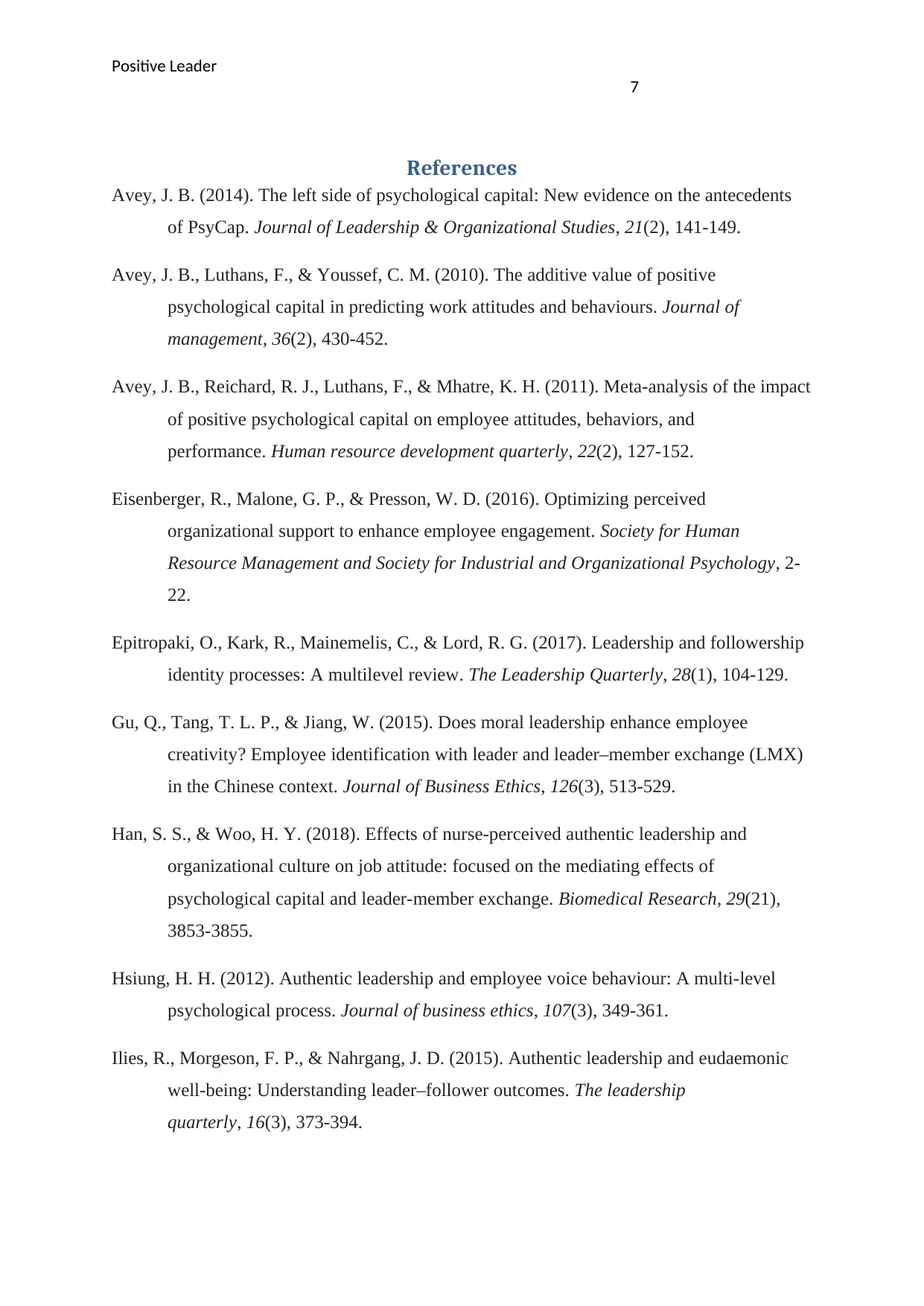
Positive Leader
7
References
Avey, J. B. (2014). The left side of psychological capital: New evidence on the antecedents
of PsyCap. Journal of Leadership & Organizational Studies, 21(2), 141-149.
Avey, J. B., Luthans, F., & Youssef, C. M. (2010). The additive value of positive
psychological capital in predicting work attitudes and behaviours. Journal of
management, 36(2), 430-452.
Avey, J. B., Reichard, R. J., Luthans, F., & Mhatre, K. H. (2011). Meta‐analysis of the impact
of positive psychological capital on employee attitudes, behaviors, and
performance. Human resource development quarterly, 22(2), 127-152.
Eisenberger, R., Malone, G. P., & Presson, W. D. (2016). Optimizing perceived
organizational support to enhance employee engagement. Society for Human
Resource Management and Society for Industrial and Organizational Psychology, 2-
22.
Epitropaki, O., Kark, R., Mainemelis, C., & Lord, R. G. (2017). Leadership and followership
identity processes: A multilevel review. The Leadership Quarterly, 28(1), 104-129.
Gu, Q., Tang, T. L. P., & Jiang, W. (2015). Does moral leadership enhance employee
creativity? Employee identification with leader and leader–member exchange (LMX)
in the Chinese context. Journal of Business Ethics, 126(3), 513-529.
Han, S. S., & Woo, H. Y. (2018). Effects of nurse-perceived authentic leadership and
organizational culture on job attitude: focused on the mediating effects of
psychological capital and leader-member exchange. Biomedical Research, 29(21),
3853-3855.
Hsiung, H. H. (2012). Authentic leadership and employee voice behaviour: A multi-level
psychological process. Journal of business ethics, 107(3), 349-361.
Ilies, R., Morgeson, F. P., & Nahrgang, J. D. (2015). Authentic leadership and eudaemonic
well-being: Understanding leader–follower outcomes. The leadership
quarterly, 16(3), 373-394.
7
References
Avey, J. B. (2014). The left side of psychological capital: New evidence on the antecedents
of PsyCap. Journal of Leadership & Organizational Studies, 21(2), 141-149.
Avey, J. B., Luthans, F., & Youssef, C. M. (2010). The additive value of positive
psychological capital in predicting work attitudes and behaviours. Journal of
management, 36(2), 430-452.
Avey, J. B., Reichard, R. J., Luthans, F., & Mhatre, K. H. (2011). Meta‐analysis of the impact
of positive psychological capital on employee attitudes, behaviors, and
performance. Human resource development quarterly, 22(2), 127-152.
Eisenberger, R., Malone, G. P., & Presson, W. D. (2016). Optimizing perceived
organizational support to enhance employee engagement. Society for Human
Resource Management and Society for Industrial and Organizational Psychology, 2-
22.
Epitropaki, O., Kark, R., Mainemelis, C., & Lord, R. G. (2017). Leadership and followership
identity processes: A multilevel review. The Leadership Quarterly, 28(1), 104-129.
Gu, Q., Tang, T. L. P., & Jiang, W. (2015). Does moral leadership enhance employee
creativity? Employee identification with leader and leader–member exchange (LMX)
in the Chinese context. Journal of Business Ethics, 126(3), 513-529.
Han, S. S., & Woo, H. Y. (2018). Effects of nurse-perceived authentic leadership and
organizational culture on job attitude: focused on the mediating effects of
psychological capital and leader-member exchange. Biomedical Research, 29(21),
3853-3855.
Hsiung, H. H. (2012). Authentic leadership and employee voice behaviour: A multi-level
psychological process. Journal of business ethics, 107(3), 349-361.
Ilies, R., Morgeson, F. P., & Nahrgang, J. D. (2015). Authentic leadership and eudaemonic
well-being: Understanding leader–follower outcomes. The leadership
quarterly, 16(3), 373-394.
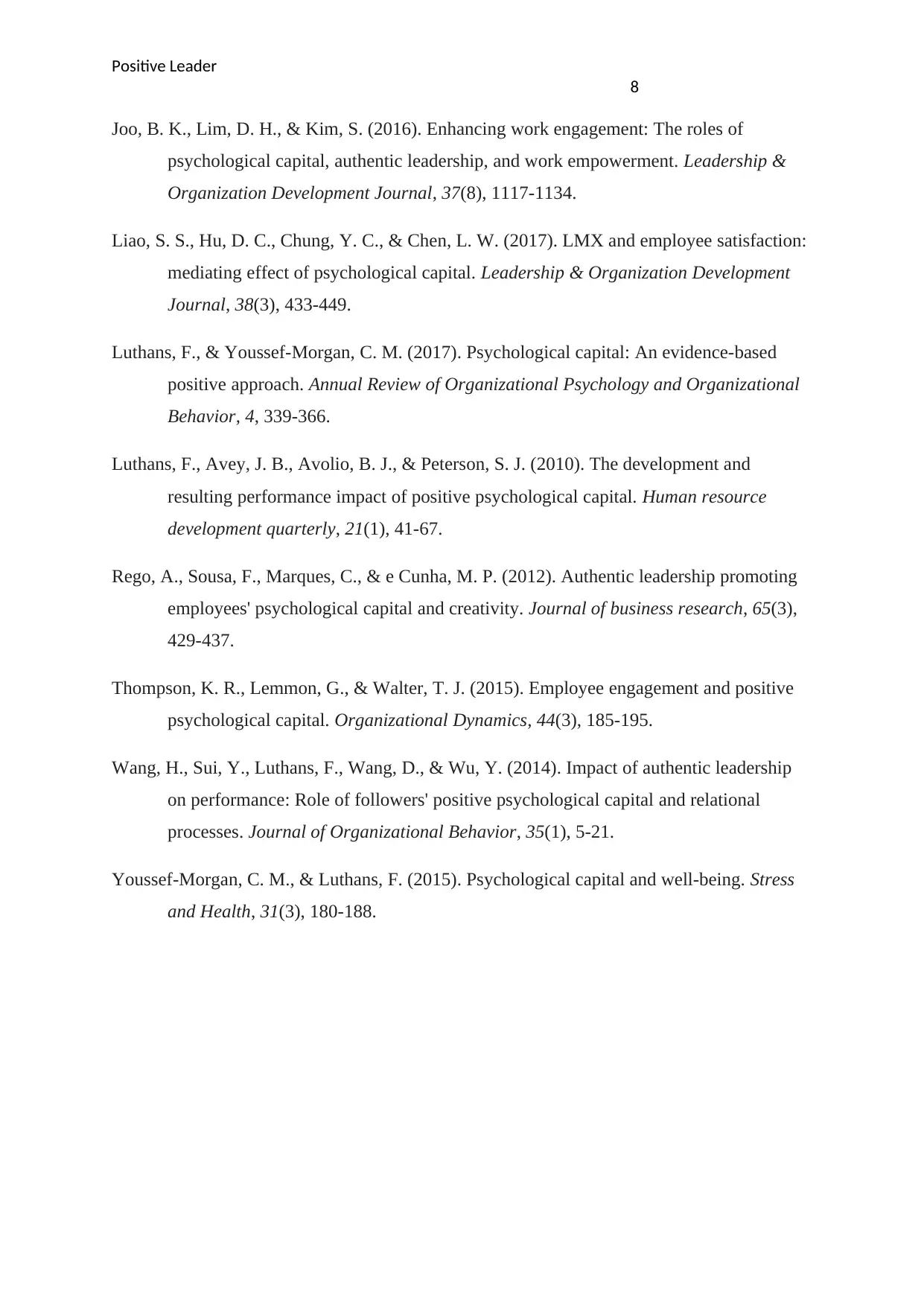
Positive Leader
8
Joo, B. K., Lim, D. H., & Kim, S. (2016). Enhancing work engagement: The roles of
psychological capital, authentic leadership, and work empowerment. Leadership &
Organization Development Journal, 37(8), 1117-1134.
Liao, S. S., Hu, D. C., Chung, Y. C., & Chen, L. W. (2017). LMX and employee satisfaction:
mediating effect of psychological capital. Leadership & Organization Development
Journal, 38(3), 433-449.
Luthans, F., & Youssef-Morgan, C. M. (2017). Psychological capital: An evidence-based
positive approach. Annual Review of Organizational Psychology and Organizational
Behavior, 4, 339-366.
Luthans, F., Avey, J. B., Avolio, B. J., & Peterson, S. J. (2010). The development and
resulting performance impact of positive psychological capital. Human resource
development quarterly, 21(1), 41-67.
Rego, A., Sousa, F., Marques, C., & e Cunha, M. P. (2012). Authentic leadership promoting
employees' psychological capital and creativity. Journal of business research, 65(3),
429-437.
Thompson, K. R., Lemmon, G., & Walter, T. J. (2015). Employee engagement and positive
psychological capital. Organizational Dynamics, 44(3), 185-195.
Wang, H., Sui, Y., Luthans, F., Wang, D., & Wu, Y. (2014). Impact of authentic leadership
on performance: Role of followers' positive psychological capital and relational
processes. Journal of Organizational Behavior, 35(1), 5-21.
Youssef‐Morgan, C. M., & Luthans, F. (2015). Psychological capital and well‐being. Stress
and Health, 31(3), 180-188.
8
Joo, B. K., Lim, D. H., & Kim, S. (2016). Enhancing work engagement: The roles of
psychological capital, authentic leadership, and work empowerment. Leadership &
Organization Development Journal, 37(8), 1117-1134.
Liao, S. S., Hu, D. C., Chung, Y. C., & Chen, L. W. (2017). LMX and employee satisfaction:
mediating effect of psychological capital. Leadership & Organization Development
Journal, 38(3), 433-449.
Luthans, F., & Youssef-Morgan, C. M. (2017). Psychological capital: An evidence-based
positive approach. Annual Review of Organizational Psychology and Organizational
Behavior, 4, 339-366.
Luthans, F., Avey, J. B., Avolio, B. J., & Peterson, S. J. (2010). The development and
resulting performance impact of positive psychological capital. Human resource
development quarterly, 21(1), 41-67.
Rego, A., Sousa, F., Marques, C., & e Cunha, M. P. (2012). Authentic leadership promoting
employees' psychological capital and creativity. Journal of business research, 65(3),
429-437.
Thompson, K. R., Lemmon, G., & Walter, T. J. (2015). Employee engagement and positive
psychological capital. Organizational Dynamics, 44(3), 185-195.
Wang, H., Sui, Y., Luthans, F., Wang, D., & Wu, Y. (2014). Impact of authentic leadership
on performance: Role of followers' positive psychological capital and relational
processes. Journal of Organizational Behavior, 35(1), 5-21.
Youssef‐Morgan, C. M., & Luthans, F. (2015). Psychological capital and well‐being. Stress
and Health, 31(3), 180-188.
⊘ This is a preview!⊘
Do you want full access?
Subscribe today to unlock all pages.

Trusted by 1+ million students worldwide
1 out of 9
Related Documents
Your All-in-One AI-Powered Toolkit for Academic Success.
+13062052269
info@desklib.com
Available 24*7 on WhatsApp / Email
![[object Object]](/_next/static/media/star-bottom.7253800d.svg)
Unlock your academic potential
Copyright © 2020–2026 A2Z Services. All Rights Reserved. Developed and managed by ZUCOL.





